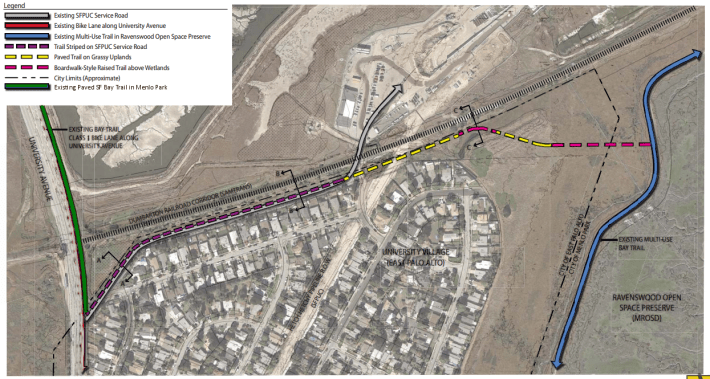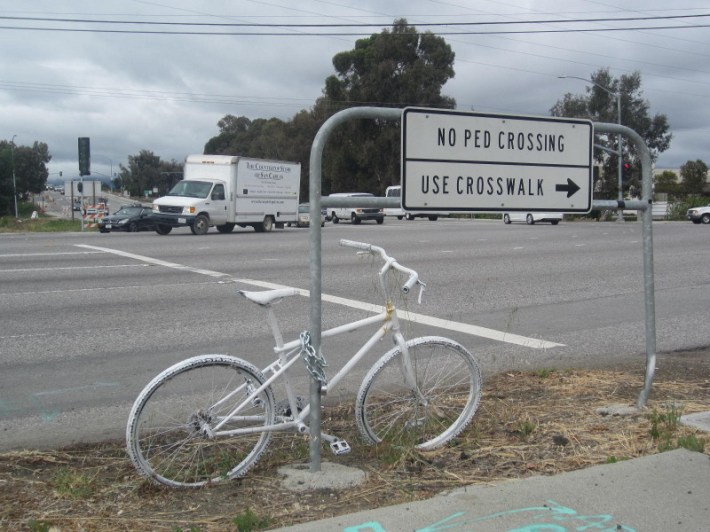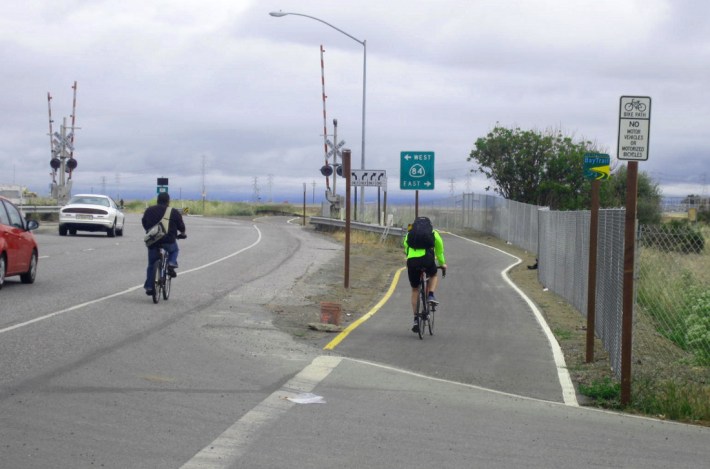
The pieces are in place to build a key link in the San Francisco Bay Trail, providing a continuous bike route through East Palo Alto and Menlo Park. Given the trail's proximity to Facebook and the lack of housing close to the company's campus, East Palo is also looking to strengthen its affordable housing policies to ensure that current residents can afford to stay in the city and benefit from the new path.
Local officials from five different agencies met on Monday to iron out the details of an agreement that fully funds the San Francisco Bay Trail through East Palo Alto, filling in the 100-mile network of off-street trails connecting Redwood City and Union City with downtown San Jose, Mountain View, and central Santa Clara.
"This is one of the most difficult gaps in the Bay Trail to complete," said San Mateo County Parks Director Marlene Finley, whose department will manage funds for the project. "It's wonderful that all the project partners are able to come together and get this done."
The missing section lies within both East Palo Alto and Menlo Park, and is subject to a number of regulatory agencies where the trail will cross protected wetlands in the Ravenswood Open Space Preserve. The multi-jurisdictional nature of the project and complex political environment has delayed it for decades while every other section of the San Francisco Bay Trail in the mid-Peninsula region has been built or improved. The network of continuous off-street trails now stretches nearly from the Union City BART Station to downtown San Jose, except for this remaining gap.

"As someone who regularly leads bicycle commuting rides through this area, the completion of the missing Bay Trail segment in East Palo Alto will be a big boost to recreational and commuter bicyclists," said SF2G Bicycle Commuting Club co-founder Brett Lider. "This increased bike traffic makes it even more important to fix the hazardous intersections along Bayfront Expressway in Menlo Park that lead to to the new path, especially at Marsh Road, Willow Road, and University Avenue."
The project, lacking funds, remained dormant after a feasibility study was published by Menlo Park in 2005 [PDF]. Facebook's relocation in 2012 to the former Sun Microsystems campus just west of the missing trail section finally provided a catalyst, with Menlo Park requiring the social media giant to build a half-mile section of the trail lying within its own borders along University Avenue as a condition of development. The remaining half-mile of trail in East Palo Alto was excluded from the agreement, however, and Facebook declined to fund it, offering instead to work with other large employers to seek private or public monies for its completion.
"We have been longtime supporters of the Ravenswood Bay Trail Connection Project," wrote Facebook Vice-President of Global Real Estate and Facilities John Tenanes in a statement yesterday. "Facebook has actively supported the Association of Bay Area Governments and the Midpeninsula Regional Open Space District in their quest to secure the necessary funding to complete the trail, and is pleased the project will move forward soon."
"Once the trail is finished, it will be a great resource for residents and visitors, and will enable an easier commute for anyone who currently bikes or plans to bike to work,” said Tenanes.
This March, San Mateo County allocated the final $1 million of $2.1 million needed to build the trail, using funds from its 2012 Measure A. Santa Clara County and funds from the Mid-peninsula Regional Open Space District's 2014 Measure AA are the other sources of funds.

Environmental review is expected to be finished by late 2015 or early 2016, and construction should wrap in 2017. The project has yet to secure the necessary permits, including an easement from the San Francisco Public Utilities Commission (SFPUC), and approval from the state's Fish and Wildlife Department and other regulatory agencies.
"Linking the two Internet hubs -- Facebook and Mountain View's North Bayshore tech area -- the Bay Trail could help address some of the area's congestion problems," said East Palo Alto City Council Member Carlos Romero in a statement yesterday. "The trail's proximity to Palo Alto and Menlo Park may prompt employees of tech firms to bike this scenic route to work, and East Palo Alto may become more attractive to well-heeled tech workers wishing to locate closer to work, thereby bidding up the city's housing costs."
East Palo Alto strongly supports the Bay Trail completion project, citing its role in improving the health and mobility of residents in its General Plan and Bay Access Master Plan [PDF]. As housing costs soar in East Palo Alto and the region amidst Silicon Valley's economic boom, the city is also pursuing a number of anti-displacement measures [PDF].
"Unfortunately, few East Palo Alto residents are directly employed by these firms, and I would not want to see our residents burdened by an amenity that others see as a benefit," said Romero. "This is why in addition to bike and ped transportation improvements, we need strong housing protections for local low-income residents."




